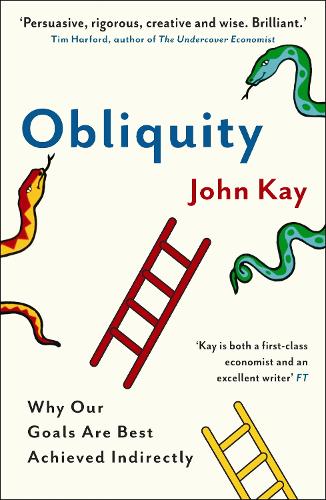
Obliquity: Why our goals are best achieved indirectly
(Paperback, Main)
Publishing Details
Obliquity: Why our goals are best achieved indirectly
By (Author) John Kay
Profile Books Ltd
Profile Books Ltd
14th April 2011
3rd February 2011
Main
United Kingdom
Classifications
General
Non Fiction
Popular psychology
650.1
Physical Properties
Paperback
224
Width 128mm, Height 196mm, Spine 20mm
164g
Description
If you want to go in one direction, the best route may involve going in another. This is the concept of 'obliquity': paradoxical as it sounds, many goals are more likely to be achieved when pursued indirectly. Whether overcoming geographical obstacles, winning decisive battles or meeting sales targets, history shows that oblique approaches are the most successful, especially in difficult terrain.
Pre-eminent economist John Kay applies his provocative, universal theory to everything from international business to town planning and from football to managing forest fires. He shows why the most profitable companies are not always the most profit-oriented; why the richest men and women are not the most materialistic; and why the happiest people are not necessarily those who focus on happiness.
Reviews
This is an elegant, simple book and, rarely for a business book, is written by a man who actually understands the academics and philosophers he quotes. The best nine quid you'll spend this year -- Jeremy Hazlehurst * City AM *
[A] smart, witty book -- William Leith * Evening Standard *
John Kay is an admirable debunker of myths and false beliefs - he can see substantial things others don't. Read this book. -- Nassim N Taleb * The Black Swan *
Economics with style as well as substance -- Stephen Bayley, architecture and design correspondent * Observer *
Obliquity is a characteristic John Kay production. It is a pleasure to read -- Howard Davies * Financial Times *
How rare is it for an academic economist to write with such clarity, intelligence and courage. And, in these troubled, confusing times, how desperately we need other dismal scientists to follow John Kay's shining example. -- Liam Halligan * Spectator Business *
Author Bio
John Kay is a visiting professor at the London School of Economics and a fellow of St John's College, Oxford. As research director and director of the Institute for Fiscal Studies he established it as one of Britain's most respected think tanks. Since then he has been a professor at the London Business School and the University of Oxford, where he was the first director of the Said Business School. He is a regular columnist for the Financial Times and the author of numerous books, including The Truth About Markets (9781848296723) and The Long and the Short of It (9780954809324).
